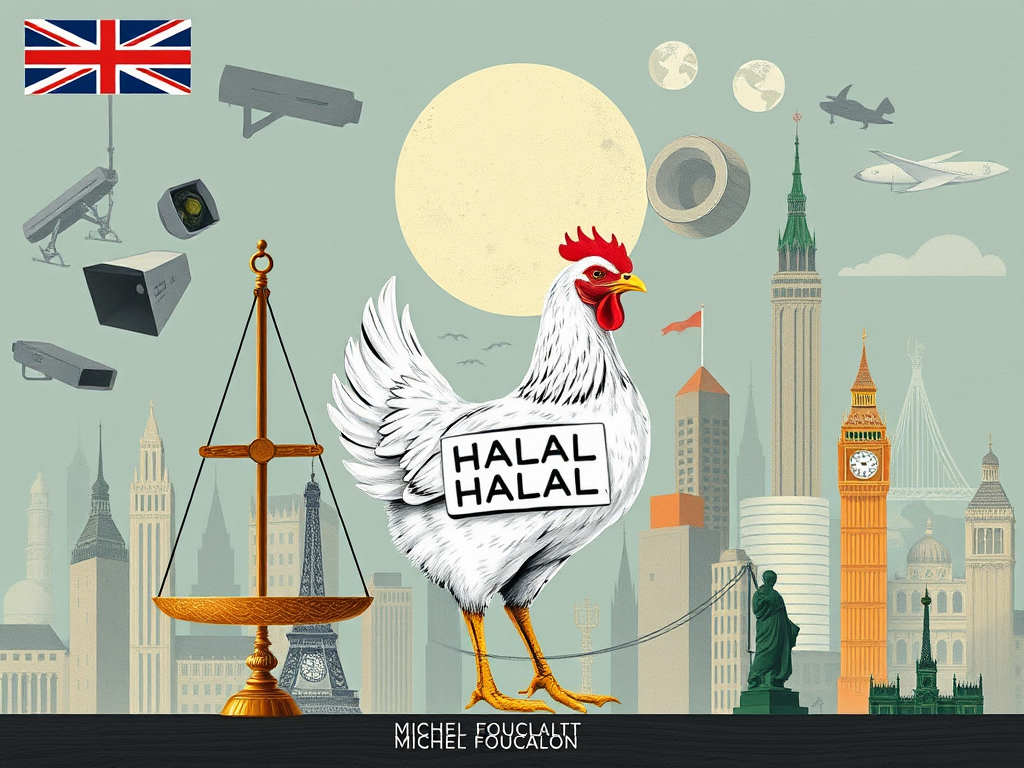Halal Chicken Labelling in the United Kingdom: An Analysis of Power-Knowledge, Discipline, and Normalization through Michel Foucault’s Perspective
Keywords:
Halal Label, Michel Foucault, power-knowledge, Discipline, Normalization, Poultry Industry, United KingdomAbstract
The halal food industry in the United Kingdom has witnessed rapid growth over recent decades, driven in part by the increasing Muslim population and the growing interest of non-Muslim consumers in products associated with ethics, quality, and hygiene. Halal chicken has become one of the main products officially labeled and widely distributed by major UK supermarket chains such as Tesco and Sainsbury’s. This article aims to analyze the dynamics of halal labeling on chicken in the UK through Michel Foucault’s theoretical lens, particularly the concepts of power-knowledge, discipline, and normalization. This research employs a qualitative approach using a literature study and respondent interviews. Data were obtained from secondary sources such as journal articles, official websites of halal certification bodies in the UK, and information provided by several respondents residing in the country. Foucault’s theoretical framework is used to understand how halal certification institutions not only set standards but also participate in the production of knowledge, oversight of industry actors, and the construction of consumption norms in society. The findings show that institutions such as the Halal Food Authority (HFA) and the Halal Monitoring Committee (HMC) perform power-knowledge functions by establishing and disseminating recognized halal standards. The stringent certification process reflects disciplinary practices within the production and consumption chain, while the availability of halal chicken in supermarkets represents the normalization of religious values within the UK’s multicultural market. Thus, through Foucault’s theory, the halal label on chicken is not merely a marker of religious compliance, but also a product of modern power relations that govern daily consumer practices.
Downloads
References
[1] Ahmad, F. N. (2025). The existence of halal logos on non-food products in Indonesia: A perspective of Michel Foucault’s power-knowledge theory. Jurnal UIN Sunan Ampel Surabaya, 7(January), 1–xx.
[2] Aziz, M. (2021, March 3). Easy shopping for halal food in the UK. Antara News. https://www.antaranews.com/berita/2100758/mudahnya-berbelanja-makanan-halal-di-inggris
[3] Bonne, K., & Verbeke, W. (2010). Halal food and ethical consumption: The views of Belgian Muslim consumers. Journal of Food Products Marketing, 16(3), 255–274. https://doi.org/10.1080/10454446.2010.484745
[4] Fischer, J. (2005). Halal, haram, or what? Creating Muslim space in London. Contemporary Islam, 1(2), 1–21.
[5] Fischer, J. (2008). Religion, science and markets: Modern halal production, trade and consumption. EMBO Reports, 9(9), 828–831.
[6] Foucault, M. (1977). Discipline and punish: The birth of the prison (A. Sheridan, Trans.). Vintage Books.
[7] Foucault, M. (1980). Power/knowledge: Selected interviews and other writings, 1972–1977 (C. Gordon, Ed.). Pantheon Books.
[8] Halal Food Authority. (2023). Standards and certification guidelines. https://halalfoodauthority.com
[9] Halal International. (2025, March 3). Definition of halal food (Indo): Definisi dan pentingnya makanan halal. Halalex. https://halalex.org/id/definition-of-halal-food-indo-definisi-dan-pentingnya-makanan-halal
[10] Halal Monitoring Committee. (n.d.). About us. Retrieved April 19, 2025, from https://halalhmc.org/about/
[11] Indarto, A. Y. (2025, March 3). Halal certification in the UK: Exploring the potential of the halal product market. Kumparan. https://kumparan.com/atu-yudhistira/sertifikasi-halal-di-inggris-menggali-potensi-pasar-produk-halal-1qklKla1XKm
[12] Lever, J., & Miele, M. (2012). The growth of halal meat markets in Europe: An exploration of the supply side theory of religion. Journal of Rural Studies, 28(4), 528–537. https://doi.org/10.1016/j.jrurstud.2012.05.002
[13] Moghaddam, M., Le, T. D., & Akbari, M. (2022). Consumer attitude toward halal food in the case of the United Kingdom: The role of product attributes and marketing stimuli. Journal of Islamic Marketing, 13(9), 1992–2012. https://doi.org/10.1108/JIMA-07-2020-0211
[14] Rahim, M. (2017, October 30). It isn’t just halal slaughter that Britain needs to make more humane. The Guardian. https://www.theguardian.com/commentisfree/2017/oct/30/halal-slaughter-more-humane-animal-welfare-lancashire
[15] Sainsbury’s. (2023). Halal food products. https://www.sainsburys.co.uk
[16] Shazans. (2025, May 2). New Shazans products in Tesco. https://www.shazans.com/new-shazans-products-in-tesco/
[17] Tesco. (2023). Our halal range. https://www.tesco.com/groceries/en-GB/shop/halal
[18] Utami, E. (2014, May 8). Halal label controversy in the UK. Suara.com. https://www.suara.com/lifestyle/2014/05/08/143116/kontroversi-label-halal-di-inggris
[19] Yakar, E. E. (2021). The progress of halal food trend in the United Kingdom. Journal of Interdisciplinary Food Studies, 1(1), 1–18. https://doi.org/10.5281/zenodo.5791121

Downloads
Submitted
Accepted
Published
How to Cite
Issue
Section
License
Copyright (c) 2025 Dini Astriani

This work is licensed under a Creative Commons Attribution 4.0 International License.







